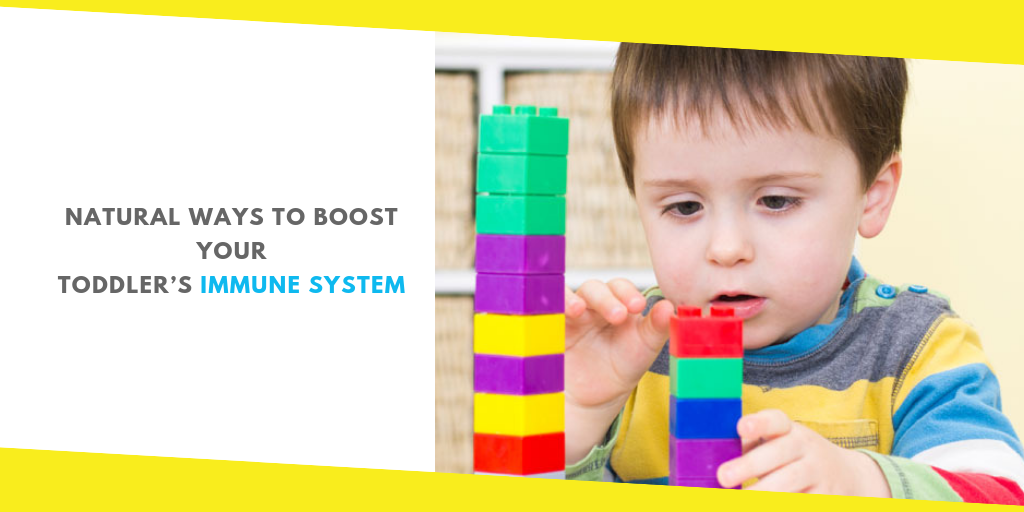Natural Ways to Boost Your Toddler’s Immune System
This post was last updated on January 16th, 2024
Vaccination is the usual course for boosting immunity from potentially fatal diseases. This, you can glean from looking at a standard immunization chart. Just because your children are up-to-date on all their shots, however, it doesn’t mean that they won’t be prone to sickness.
It’s normal for toddlers to catch a bug every now and then as their immune systems are still developing. That’s actually the natural way for them to develop immunity from certain germs. If, however, they seem to be catching every minor bug out there, it’s a clear sign that their immune system isn’t very robust.
Contents
ToggleBoosting the Immune System Naturally
Being sickly could be genetic. If you or your spouse is prone to sickness and your children seem to have inherited this trait, you don’t have to just lie back and make your peace with it. There are ways to improve the immune system so that it can better defend the body from different attacks on its health.
What are some of the powerful tools you can use to strengthen your children’s immune system?
1. A Wholesome Diet
You may have this idea that you and your family generally eat healthy. You may eat a lot of nutritious foods, but if you also allow unwholesome items to figure into your diet, then they could still wreak havoc on your health.
As much as you increase your nutritional intake, you should also as much as possible avoid harmful components from entering your diet. What are these?
- Chemical additives
- Preservatives
- Artificial flavor and color
- Sugar and high fructose corn syrup
These are the acknowledged “bad stuff,” but it’s possible for otherwise healthful foods to also have a detrimental effect on the body as in the case of natural food allergens.
An allergic reaction doesn’t always manifest as sneezing, itching, or anaphylaxis. At times, food sensitivity simply causes the sufferer to feel poorly. If you or your loved ones often seem to feel weak, restless, or dyspeptic, the cause may very well be a food allergy.
What are the most common food allergens?
- Dairy
- Eggs
- Gluten
- Nuts
- Shellfish
- Soy
Dairy and gluten can be hard to avoid, especially for toddlers who still need a couple of servings of milk a day. If your children seem to be allergic, you can simply switch to gluten and lactose-free milk.
2. A Healthy Gut
The concept of gut health as a primary influencer of the immune system is becoming increasingly popular. It’s important to maintain balance in the gut flora for a healthy digestive tract, regular toxin elimination, and protection from harmful microbes.
The good bacteria should be allowed to flourish. Unfortunately, many diets disrupt this balance, allowing bad bacteria to dominate the good bacteria. To promote gut health, make sure to give your kids probiotics daily. The following are good sources:
- Yogurt
- Sauerkraut
- Kimchi
- Kombucha
- Miso
- Pickles
3. A Good Night’s Sleep
Sleep is one of the best ways for the body to restore itself. It’s designed to get enough deep slumber during the night, allowing the liver to do its essential repairs.
Proper rest is key to vitality, and the body craves sleep in order to revitalize its systems. When your kids don’t get enough hours of sleep or if the quality of their sleep isn’t very good, you can expect their immune system to weaken.
For sufficiently restorative sleep, you need to do the following:
- Get in an acceptable number of nighttime hours of sleep. It varies per age. Children need to sleep more to aid their growth.
- Sleep in absolute darkness to encourage proper melatonin secretion.
- Promote an environment conducive to restful sleep – no gadgets near the bed, a reasonably comfortable sleeping setup, clean air, etc.
4. Regular Physical Activity
Make sure that your family is active. Being sedentary affects both children and adults. Exercise is essential to a healthy immune system. Not only does it help flush out germs and other toxins from the body, it also encourages antibodies and white blood cells to perform their disease-fighting function.
5. A Happy Home
Stress has a strong negative impact on the immune system. It’s important for children to be mentally and emotionally healthy. This is generally supported by a happy home life.
Children can develop stress, anxiety, and depression from feelings of insecurity, so make sure you make them feel as loved and cared for as possible.
Easy and Simple
You don’t need to do anything complicated to boost your children’s immune system. Feed them well, get them active, impose a proper bed time, inspire a happy disposition — these can go a long way in helping their little bodies fight off germs and disease.
Recommended For You
Crazy and Funny Ways to Beat Your Depression
Most Inside
Most Inside offers high-quality recommendations and valuable updates to enhance all aspects of your life, providing premium guidance and enriching experiences.





